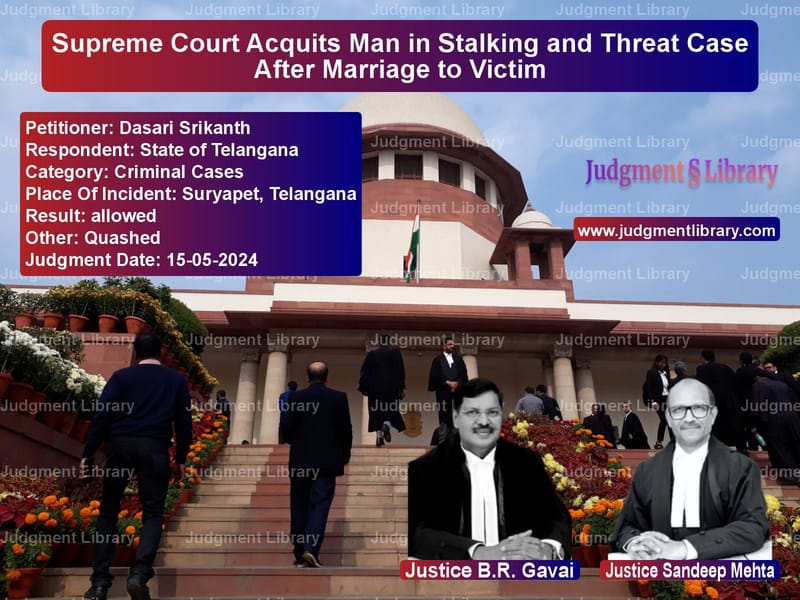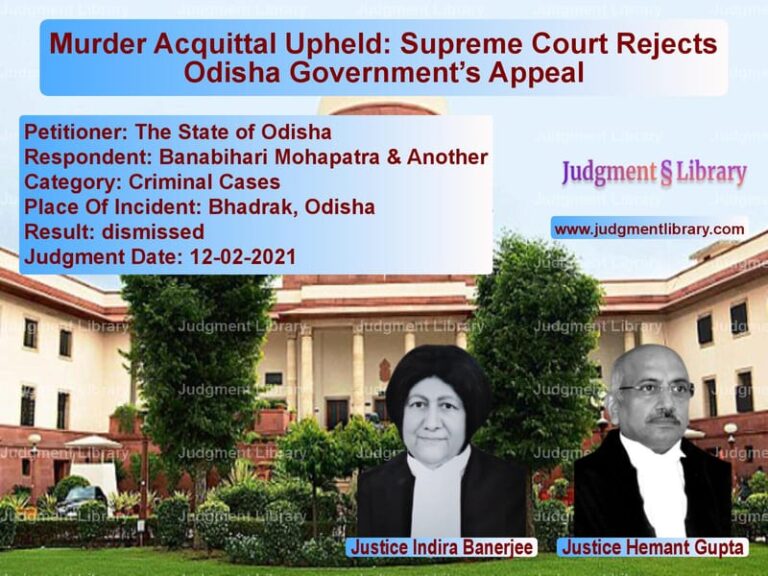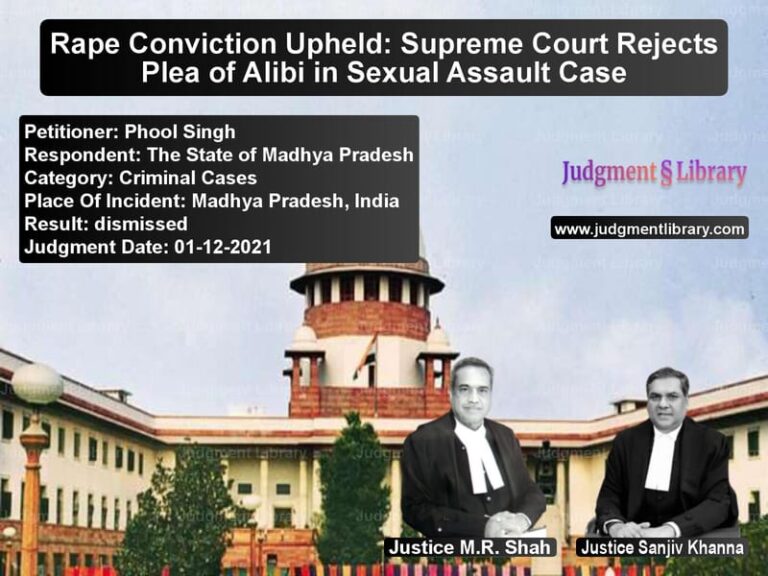Supreme Court Acquits Man in Stalking and Threat Case After Marriage to Victim
The case of Dasari Srikanth vs. State of Telangana is a unique ruling where the Supreme Court quashed the conviction of a man accused of stalking and criminal intimidation after he married the complainant. The judgment, delivered on May 15, 2024, highlights the Court’s use of Article 142 of the Constitution to ensure complete justice, acknowledging that the complainant and accused were in a relationship and later married each other.
Background of the Case
The case originated from a criminal complaint filed against Dasari Srikanth under Sections 354D (stalking) and 506-Part I (criminal intimidation) of the Indian Penal Code (IPC), along with Section 11 read with Section 12 of the Protection of Children from Sexual Offences Act, 2012 (POCSO). The allegations stemmed from the accused persistently following and threatening the complainant.
The case was heard in the Special Fast Track Court, Suryapet, which acquitted the accused of charges under the POCSO Act but convicted him under IPC Sections 354D and 506. The trial court sentenced him to:
Read also: https://judgmentlibrary.com/supreme-court-quashes-arrest-and-remand-in-uapa-case-against-journalist/
- 2 years rigorous imprisonment and a ₹1,000 fine under Section 354D IPC.
- 6 months simple imprisonment and a ₹500 fine under Section 506-Part I IPC.
The accused appealed to the Telangana High Court, which, on June 27, 2023, reduced his sentence to 3 months for both offenses but upheld the conviction.
Marriage Between the Accused and the Complainant
While the appeal was pending in the Supreme Court, a significant development occurred:
- The accused and the complainant married each other on August 6, 2023, under Hindu rites and customs.
- Their marriage was registered on September 23, 2023, at the Office of Registrar of Hindu Marriages and Sub Registrar, Kodad, Suryapet District, Telangana.
- An affidavit from the complainant confirming the marriage was submitted to the Court.
Recognizing the changed circumstances, the Supreme Court sought verification of the marriage from the State of Telangana. The police confirmed that the couple had indeed married.
Arguments by the Petitioner (Dasari Srikanth)
The petitioner’s counsel argued:
- The complainant and accused were in a mutual relationship at the time of the alleged offense.
- The marriage demonstrated that there was no actual criminal intent in the accused’s actions.
- Upholding the conviction would negatively impact their marriage and could harm the complainant’s future.
- The Supreme Court had the power to quash the conviction under Article 142 to prevent injustice.
Arguments by the Respondent (State of Telangana)
The State opposed the appeal but acknowledged:
- The marriage had taken place and was legally registered.
- The complainant was no longer pursuing charges against the accused.
- The Supreme Court had the discretion to quash the conviction considering the changed circumstances.
Supreme Court’s Observations
1. Use of Article 142 for Complete Justice
The Supreme Court held that it had the power to quash criminal proceedings under Article 142 to ensure justice in special circumstances. The Court noted:
“The affirmation of the judgment rendered by the High Court would have the disastrous consequence of the accused appellant being sent to jail, which in turn could put his matrimonial relationship with the complainant in danger.”
2. Relationship Between the Accused and Complainant
The Court observed that since the accused and complainant had married, their prior interactions must have involved some level of consent:
“The fact that the appellant and the complainant have married each other gives rise to a reasonable belief that both were involved in some kind of relationship even when the offenses alleged were said to have been committed.”
3. Quashing Conviction to Protect Matrimonial Life
The Court emphasized that continuing the conviction would harm the couple’s future:
“The appellant and the complainant have married each other. The continuation of the conviction would adversely affect their marital relationship.”
Key Findings and Judgment
The Supreme Court ruled:
- The conviction of the accused under Sections 354D and 506-Part I IPC was quashed.
- The judgment dated June 27, 2023, of the Telangana High Court and the judgment dated April 9, 2021, of the Trial Court were set aside.
- The accused was acquitted of all charges.
The Court ordered:
“The impugned judgment dated 27th June, 2023, passed by the High Court and judgment dated 9th April, 2021, passed by the trial Court are hereby quashed and set aside. The appellant is acquitted of the charges.”
Implications of the Judgment
- Judicial Consideration of Personal Relationships: Courts may consider personal relationships while deciding criminal cases.
- Application of Article 142 for Complete Justice: The ruling sets a precedent for using Article 142 in special circumstances.
- Impact on Similar Cases: This ruling could influence future cases where complainants and accused enter into marriage.
- Balancing Law with Human Relationships: The judgment highlights the need to balance legal provisions with personal realities.
Conclusion
The Supreme Court’s decision in Dasari Srikanth vs. State of Telangana is a landmark ruling demonstrating the judiciary’s flexibility in ensuring justice. By considering the changed circumstances, the Court has ensured that the legal system does not become an obstacle to the couple’s future. This case will serve as a reference for courts in deciding similar matters where relationships evolve after the filing of criminal cases.
Read also: https://judgmentlibrary.com/supreme-court-quashes-criminal-proceedings-in-kerala-bigamy-case/
Petitioner Name: Dasari Srikanth.Respondent Name: State of Telangana.Judgment By: Justice B.R. Gavai, Justice Sandeep Mehta.Place Of Incident: Suryapet, Telangana.Judgment Date: 15-05-2024.
Don’t miss out on the full details! Download the complete judgment in PDF format below and gain valuable insights instantly!
Download Judgment: dasari-srikanth-vs-state-of-telangana-supreme-court-of-india-judgment-dated-15-05-2024.pdf
Directly Download Judgment: Directly download this Judgment
See all petitions in Bail and Anticipatory Bail
See all petitions in Custodial Deaths and Police Misconduct
See all petitions in SC/ST Act Case
See all petitions in Judgment by B R Gavai
See all petitions in Judgment by Sandeep Mehta
See all petitions in allowed
See all petitions in Quashed
See all petitions in supreme court of India judgments May 2024
See all petitions in 2024 judgments
See all posts in Criminal Cases Category
See all allowed petitions in Criminal Cases Category
See all Dismissed petitions in Criminal Cases Category
See all partially allowed petitions in Criminal Cases Category







